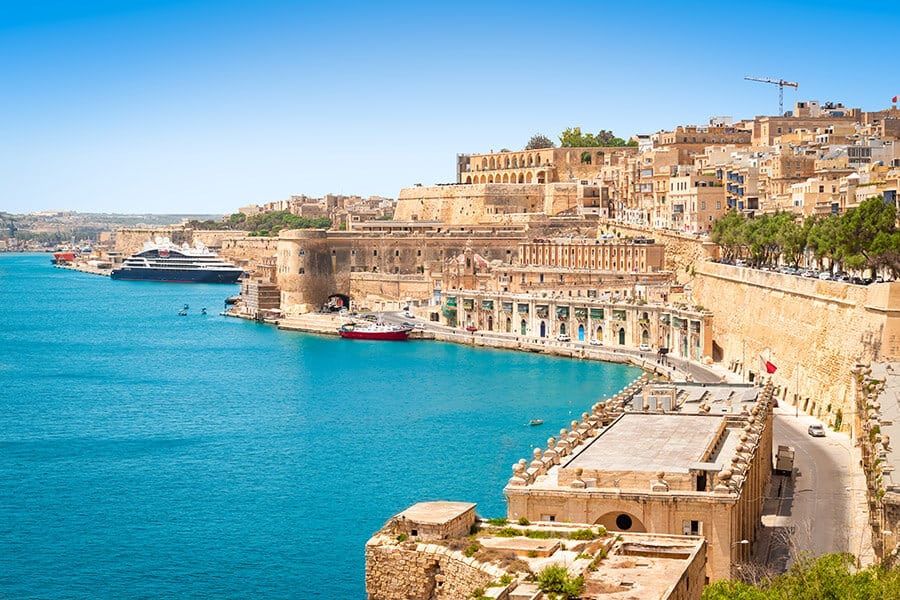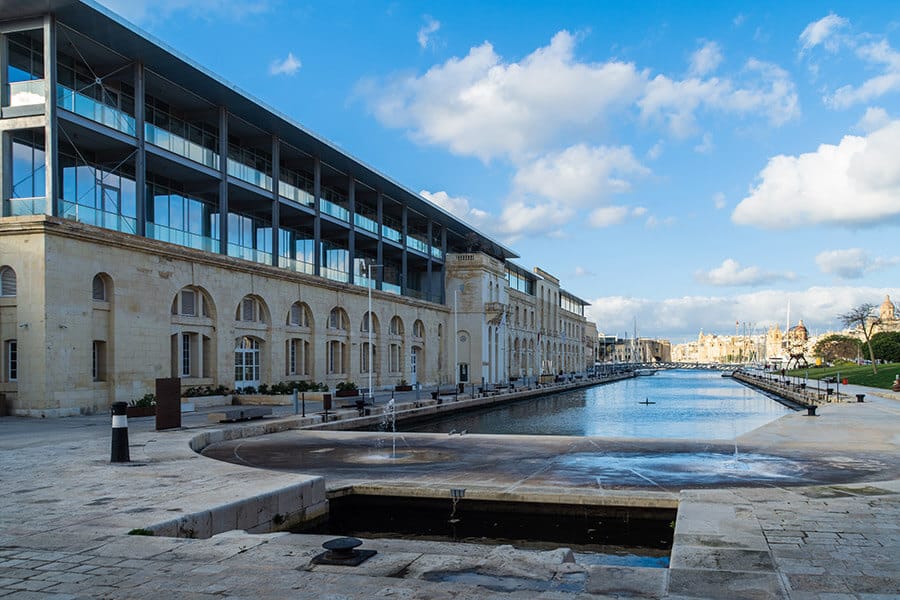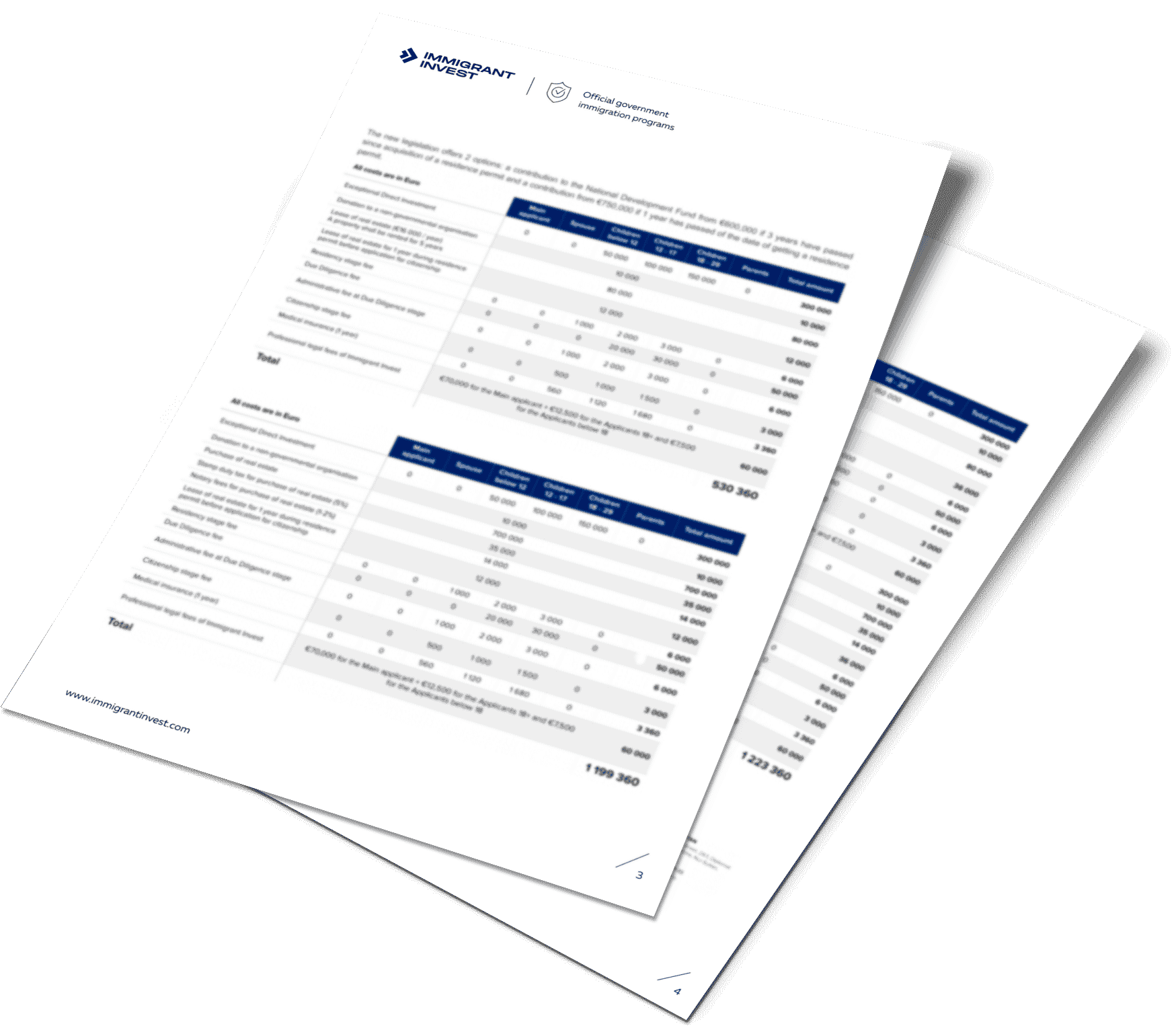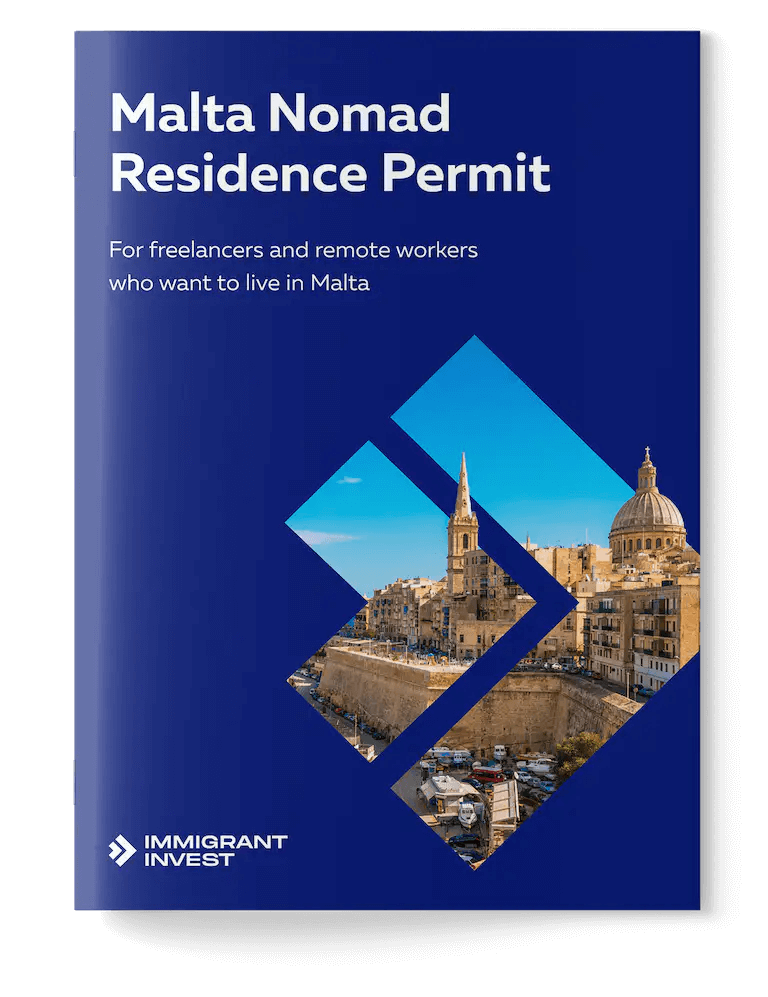7 possible ways to obtain a Malta residence permit
The Maltese law allows foreign nationals to obtain residence permits on the following grounds:
- by investment;
- by starting a business;
- by marriage;
- as a digital nomad;
- for family reunification;
- by employment;
- for studying.
Let’s go through each of the options.
Malta residence permit by investment: requirements for applicants
The Malta Global Residence Programme was launched in 2013. It allows foreign nationals to obtain residency in around 4 months.
Investors are not obliged to live in Malta permanently to retain the permit. However, they are not allowed to spend more than 183 days a year in a country other than Malta.
Non-EU citizens who obtain a residence permit by investment pay taxes according to a special regime. Their income from outside Malta is subject to a 15% flat tax. The minimum tax due for a family is €15,000 per year.
To participate in the programme, the main applicant has to be over 18, have no criminal record, and be able to communicate in English or Maltese. Aside from that, the investor is required to provide proof of stable and legal income and get medical insurance for each family member in the application.
The Malta Global Residence Programme requirements are recorded on the official website.
Expenses for obtaining a Malta residence permit by investment
| Location | Rent | Purchase | Administration fee |
| The island of Gozo and south of Malta | €8,750+ | €220,000+ | €5,500+ |
| The central and northern parts of the island of Malta | €9,600+ | €275,000+ | €6,000 |
7 Benefits of the Malta residence permit for investors
1. Life in Malta. Investors and their family members holding residency can visit Malta at any desirable time and stay here for as long as they want.
2. Visa-free travel across Europe. Residents of Malta can enter all the Schengen states without visas for short stays of up to 90 days every 6 months.
3. Residency for the whole family. The applicant’s spouse, their principally dependent children under 25, siblings, parents, and grandparents can also obtain residence cards.
4. Special taxation regime. The applicant pays a 15% tax for income earned abroad and transferred to Malta with the minimal tax due for a family of €15,000 per year. Holders of ordinary residence permits in Malta cannot join this regime.
5. Access to high-quality healthcare. In 2017, the Maltese healthcare system was named the top 9th in the world, as per The Lancet ranking.
Investors can take advantage of local clinics and hospitals — the medical insurance acquired to obtain the permit will allow them to do so. Prices for medical services in Malta are lower than in such countries as France or Germany.
6. European-level education for children. Investors and their children can enrol in Maltese universities without obtaining a special student visa. The higher education system of Malta is based on the Bologna system, so Maltese diplomas are fully recognised in other EU countries as well as in the USA.
7. Affordable cost of living. In 2023, the price level index in Malta was 12.4% lower than the EU average and over 40% lower compared to such countries as Austria, Switzerland, and Denmark, according to Eurostat. At the same time, Malta offers high standards of living and allows one to choose the most suitable lifestyle, either active in one of the cities or tranquil in rural areas.

How to get the Malta residence permit by investment: a step-by-step procedure
Authorised Mandatory of the Programme: we assist investors in obtaining a residence permit in Malta, acting under the registration number ARM03173.
At this stage, applicants understand the Malta Global Residence Programme requirements and benefits and discuss financial implications and timelines. Our Compliance Anti Money Laundering Officer evaluates the eligibility of each applicant.
Immigrant Invest lawyers assist applicants in gathering necessary documents, as well as in translating and certifying them.
Immigrant Invest lawyers submit the completed application, including all necessary documents, to the Inland Revenue Department (IRD) of Malta on behalf of the applicant. An administrative fee of €5,500 or €6,000 is paid.
The Maltese authorities conduct a comprehensive due diligence check. This process ensures the program’s integrity by admitting only applicants with a clean background.
At this stage, the applicant is required to come to Malta. They undergo an interview with an IRD officer. If the officer approves the applicant’s participation in the Malta residence programme, the investor pays the minimum tax amount. Two weeks after the payment, a certificate of special tax status and a tax number are issued.
The tax status certificate allows the applicant to apply for a residence permit. Before application, the investor rents or purchases real estate in Malta. The investor and all family members included in the application also undergo fingerprinting.
After the applicant satisfies all program requirements, the Maltese authorities grant residence status and issue the residence card.
Documents for the Malta residence permit obtainment
Applicants for Malta Global Residence provide the following documents:
- Valid travel document.
- The final deed of a property purchase or the lease agreement.
- Declaration of the income and its source.
- Bank statement showing a balance of at least €30,000 per family member.
- Insurance covering the applicant and all their dependants.
- Declaration confirming the applicant can adequately communicate in English or Maltese.
- Police conduct certificate.
- Sworn declaration taken before a Commissioner for Oaths in Malta confirming that the applicant is not subject to any ongoing civil or criminal proceedings.
- Application Form.
- Questionnaire.
How to obtain Malta residency by starting a business
To obtain a Maltese residence permit by opening a business, the applicant needs to invest at least €500,000 in the Maltese economy within six months of the employment licence being issued. This sum is required to purchase commercial real estate and the necessary equipment.
An investor can do a couple of things to increase their chances of getting approved. First, they can commit to employing at least three EEA, Switzerland, or Malta citizens in the newly formed company within 18 months of its establishment.
Aside from that, investors will increase their chances of getting accepted by obtaining official approval of their business plan from the Malta Enterprise, the country’s economic development agency.
Applications for residence permits in Malta by establishing a business are processed in 2 months.
Malta residency for digital nomads
Malta allows digital nomads to obtain residency and move to the country. The initial status is granted for 1 year and can then be extended for an additional year twice. Digital nomads living in Malta do not pay taxes on income earned outside Malta.
Malta residency requirements for digital nomads include the following:
- be self-employed or employed for a company outside Malta and be able to work remotely;
- purchase or rent real estate in Malta;
- prove income of at least €2,700 per month or €32,400 per year.
The applicant’s family, including a spouse and principally dependent children, obtain residence permits together with the digital nomad.
Applications for a Malta Nomad Visa are submitted online via the Residency Malta Agency portal. The Agency reviews applications for up to 30 working days. In case of approval, the applicant receives a Letter of Approval in Principle and provides proof of housing and insurance.
When all the confirmations are provided, the Agency issues a Letter of Final Approval. The applicant visits Malta to provide biometrics, applies for residency cards, and pays an issuance fee. The whole residence permit obtaining process takes around 5 months.
Malta residency by marriage and for family reunification
Foreigners who are married to Maltese citizens can obtain residency permits. For that, they need to register their marriage and get a marriage certificate to provide it with the application. After that, the foreign national can apply for residency.
Close relatives of the applicant can obtain residency, too. For that, the main applicant needs to provide proof of the following:
- accommodation for each family member;
- stable income no less than the average wage in Malta, which is €1,060 per month.
Residency for family reunification can be obtained by spouses of Maltese citizens no younger than 21 and children under 18.
Malta residency for students
International students who enrol in Maltese universities can obtain a special residence permit that is valid for the duration of their studies.
For short courses lasting up to 90 days, they apply for a Schengen short-stay C visa.
For more extended studies, a national long-term D visa is required. Students must provide a university admission certificate, their class schedule, proof of the tuition fee payment, and the availability of funds to live in Malta.
Those applying for a short-stay visa need to provide biometric data. For a long-term visa, this requirement does not apply.
Most applications are reviewed within 7 to 15 business days. In some cases, the consideration period may be extended to 30 days and up to 60 days in exceptional circumstances.
Students' residence permits must be renewed on a regular basis at the Central Visa Unit of Malta or through the Expatriates Unit of Identity Malta Agency.
A student residence permit allows its holder to both study and work in Malta. The work hours with this permit are limited to 20 hours per week.

Malta residence permit for employment
Professionals specialising in in-demand industries in Malta, such as medicine, tourism or IT, can obtain permits for residence and work in the country.
The applicant needs to provide an invitation from their employer indicating the need for employment. The invitation must mention that the company couldn’t find a suitable candidate for the job in Malta or other EU countries.
The processing time for the applications is around 3 months. If the applicant is an IT specialist with over 3 years of experience and a salary of at least €30,000, they can get their approval in 5 days.
The permit is valid for one year. After that, it has to be renewed.
Malta residence permit: a summary
- Foreigners can obtain Malta residency in several ways: by investment, by starting a business, by marriage, as a digital nomad, for family reunification, by employment, or by studying.
- Foreign investors participate in the Malta Global Residence Programme. To qualify for residency, they need to rent or buy real estate in Malta and pay an administrative fee. Minimum investment starts at €220,000+ in the case of property purchase and at €8,750 per year in the case of renting real estate.
- Entrepreneurs obtain Malta residency for an investment of €500,000+ in the Maltese economy.
- Requirements for a digital nomad residence permit include working for a company outside Malta, purchasing or renting real estate on the island, and earning an income of at least €2,700 per month or €32,400 per year.
- To get a residence permit by employment, study, or marriage, an applicant needs to provide corresponding supporting documents: an invitation from the employer, a university admission certificate, or a marriage certificate, respectively.
Frequently asked questions
There are a number of ways to obtain residency in Malta, including making an investment, funding a business in Malta, moving to Malta as a digital nomad, and enrolling in a Maltese university.
Investors can obtain a permit in around 4—5 months by joining the Malta Global Residence Programme. Malta GRP applicants must rent or purchase housing in Malta and pay an administrative fee.
The time frame and costs of obtaining residency in Malta depend on the chosen path to it.
Spouses of Maltese citizens can obtain residency permits pretty quickly and without significant expenses.
Digital nomads obtain residency in Malta in about 5 months.
Another fast way to obtain a residence permit is to join the Malta Global Residence Programme. The applicants rent or purchase real estate in Malta and pay an administration fee. The obtainment period is 4—5 months.
There are multiple ways for foreign nationals to obtain a residency permit in Malta:
- by investment;
- by starting a business;
- as a digital nomad;
- by marriage and for family reunification;
- by employment;
- for studying.
A residence permit allows its holder to live in Malta and travel visa-free to all the Schengen states.
Investors who obtain the permit by joining the Malta Global Residence Programme get additional benefits, such as a special tax regime. They will pay a 15% tax for income earned abroad and transferred to Malta with the minimal tax due for a family of €15,000 per year.
To join the Malta Global Residence Programme, the applicant has to meet the following requirements:
-
- be over 18 years old;
- have no criminal record;
- be able to communicate in English or Maltese.
All the applicants are required to get medical insurance, have a stable legal income and pass Due Diligence.
The programme implies purchasing or renting housing in Malta and paying an administration fee.
The price for real estate and the administration fee depend on the property location:
| Location | Rent | Purchase | Administration fee |
| The island of Gozo and south of Malta | €8,750+ | €220,000+ | €5,500 |
| The central and northern parts of the island of Malta | €9,600+ | €275,000+ | €6,000 |
In this case, you can obtain a residence permit by starting a business in Malta, as a digital nomad, or by investment.
The timeframe depends on the chosen way of obtaining a permit. Students’ applications take up to 60 days to process. Entrepreneurs can obtain their permits in 2 months. The investment path takes around 4 months. Malta Nomad Visa is obtained in 5+ months.
The total costs of obtaining Malta residency depend on the chosen path.
Students of Maltese universities, family members of Maltese citizens, and employers of companies in Malta only pay administrative fees for application processing and residence card issuance.
Digital nomads have to additionally buy or rent property in Malta, purchase health insurance, and prove an income of €2,700 per month or €32,400 per year.
The Malta Global Residence program participants are required to rent or buy housing in Malta, purchase medical insurance, and pay administrative fees. Property expenses depend on the location, starting at €8,750 for renting property and €220,000 for purchasing property. The administrative fee is €5,500+.
Yes, you can move to Malta to live permanently. To do this, you need to obtain a Malta residence permit under the path that is most suitable for you.
Malta residency can be obtained in 7 ways:
- by investment;
- by starting a business;
- as a digital nomad;
- by marriage and for family reunification;
- by employment;
- for studying.






 Zlata Erlach
Zlata Erlach